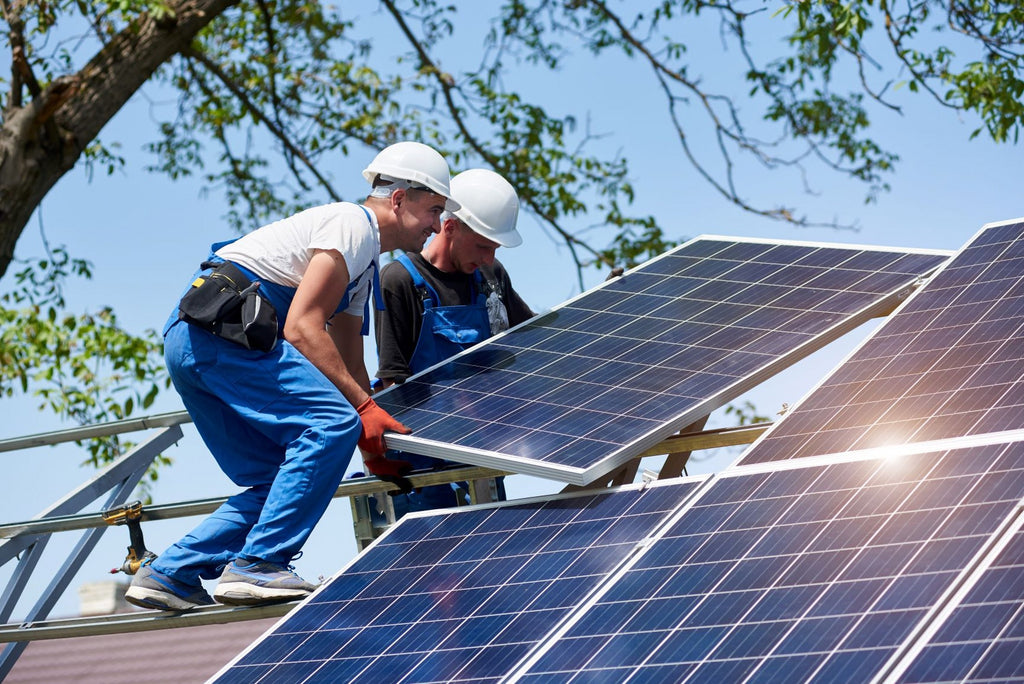Surge in Homes Powered by the Sun, But Do Your Homework So You Don't Get Burned

June 17, 2022 - KUOW by Tom Banse
Solar power installations on home rooftops are surging in Oregon and Washington state. Alongside, you may have noticed an uptick in ads pitching rooftop solar, or even gotten an in-person solicitation. Some of the sales pitches contain dubious or potentially misleading claims. And now, consumer watchdogs are urging homeowners to do their homework before signing any contract.
In hindsight, Pasco, Washington, retiree Bob Layman wishes he and his wife had done more research about the solar installer they selected to put panels on their roof. Part of their system was improperly wired. That meant the Layman's could not get an accurate meter readout to collect state solar production incentive payments.
"It runs smoothly other than the fact that the meter was hooked up wrong and didn't give us a payout," Layman said in an interview.
It took three years, innumerable phone calls and multiple house calls before the wiring snafu was fixed and the couple collected the back incentive payout.
"They were misleading in communication with me and trying to get me to settle for less than half of what they actually owed me,” Layman said of the saga with the vendor. “They just quit talking to me."
The installer company did not reply to a request for their side of the story.
Going green has much appeal, but if it costs you more greenbacks or stress than you expected, you could be left feeling green around the gills.
In Oregon, complaints to the consumer protection division in the Oregon Department of Justice related to residential solar doubled between 2019 and 2021, albeit starting from a low level.
Earlier this year, the Idaho Attorney General issued a consumer alert warning about misleading sales tactics by some solar companies.
A spokesperson for the Washington State Attorney General said that agency’s consumer protection division tallied nearly a hundred complaints since 2019 about this sector, including about deceptive advertising and high pressure sales. The tally still pales beside top generators of complaints such as e-commerce shopping and telecom services, so there was no indication action similar to Idaho was imminent.
The onslaught of solar energy marketing in social media and online is resulting in ads showing up in such wide ranging places such as at the beginning of bonsai pruning videos or 1980’s music hits.
A Nevada-based digital marketing firm produced one widely-seen ad that begins with this dubious claim, "If you're a Washington homeowner, 2022 is your LAST chance to go solar."
When the staff at long-established Western Solar in Bellingham saw that ad and others like it, they were moved to write a blog post titled, “How to protect yourself from solar scams & high-pressure sales.”
The reality is that the state's and most local utility solar programs aren't scheduled to change between this year and next. A federal tax credit decreases only slightly next year.
“Installations completed in 2022 are eligible for a 26% tax credit, with a 22% credit for systems installed in 2023,” Trish Merriman of Western Solar wrote. “Unless Congress renews it, the (federal) tax credit expires for residential installs starting in 2024.”
Another come-on that surfaced this spring in online ads is that you could "get solar installed on your home at no cost." Reputable solar installers said just like there's no such thing as a free lunch, there's no such thing as free solar panels either.
"Over the long run, they can pay for themselves, for sure. Over the short run, they are not free,” said Todd Currier, director of the Washington State University Energy Program. “What does the long run mean? It can be ten, twelve, fifteen years before a system pays for itself."
Currier said he has unfortunately heard about seniors being sold systems with long-term financing plans totally unsuitable for an old person.
The president of the Washington Solar Energy Industries Association said the trade group's members agree there is a problem.
"Ultimately in Washington state, it's buyer beware," said Markus Virta, who is also director of sales for Western Solar in Bellingham.
Virta said trade groups like his don't have the power to police non-member bad actors, which include sales lead compilers and other out-of-state outfits solely focused on remote marketing. Virta says the honest players in the business are talking with utility companies and state agencies about how to step up consumer protection.
"We’re doing our best to brainstorm what we can do, what leverage mechanisms we can take to try to snuff out these misleading and frankly false claims that are being made," Virta said in an interview Thursday.
Virta's advice for people wanting to go solar is to get multiple bids. He reiterated to never sign the contract on the table during your first sales meeting with a contractor. And make sure you end up dealing with a system designer, not just the sales or marketing person.
Currier said he would want potential contractors to come out and do site assessments in person before submitting their bids to install a solar system.
A spokesperson at Oregon's Department of Justice recommended starting at a U.S. Department of Energy-backed website named EnergySage.com.
This all is happening in the context of record numbers of new rooftop solar installations. According to data from the Solar Energy Industries Association, annual solar installations in Oregon rose by more than 50% last year. Washington also experienced double-digit percentage growth with Idaho trailing a little behind, but still growing briskly.
Puget Sound Energy alone reported to the WSU Energy Program that it connected 2,000 new residential solar arrays in 2021 and said it was on track for 3,000 new interconnections this year.
Virta identified multiple forces behind the acceleration of installations. He said the coronavirus pandemic played a big role by leading people to spend more on home projects and renovations, which sometimes meant acquiring a solar energy system.



